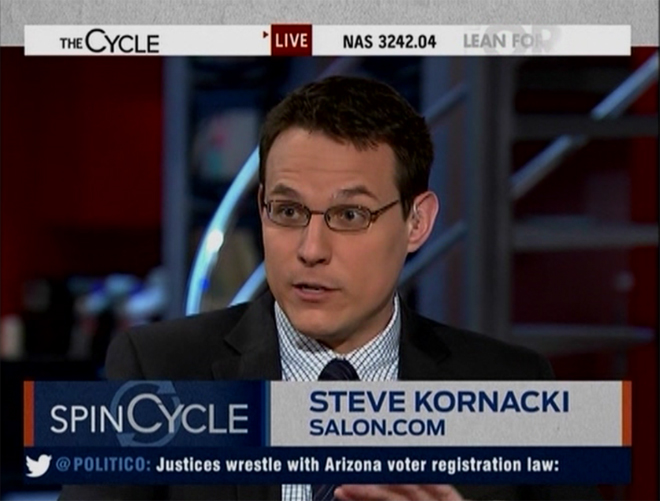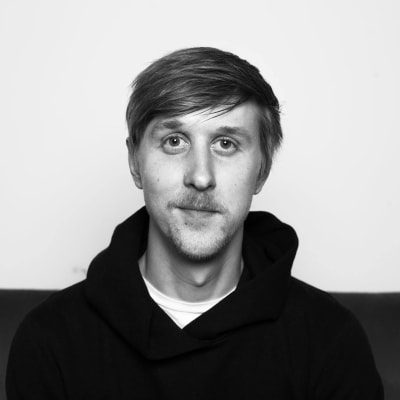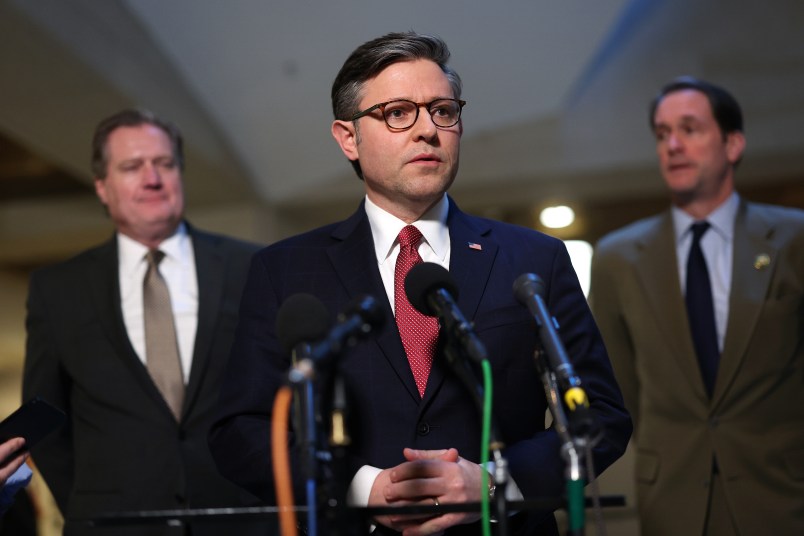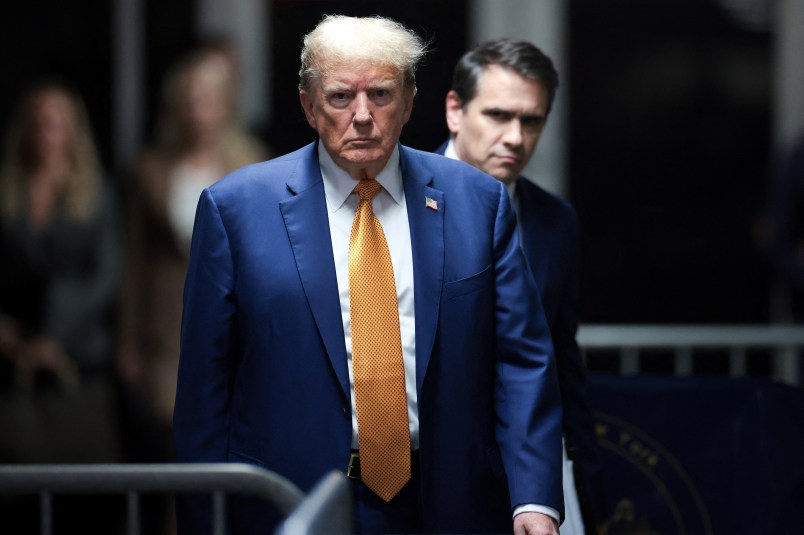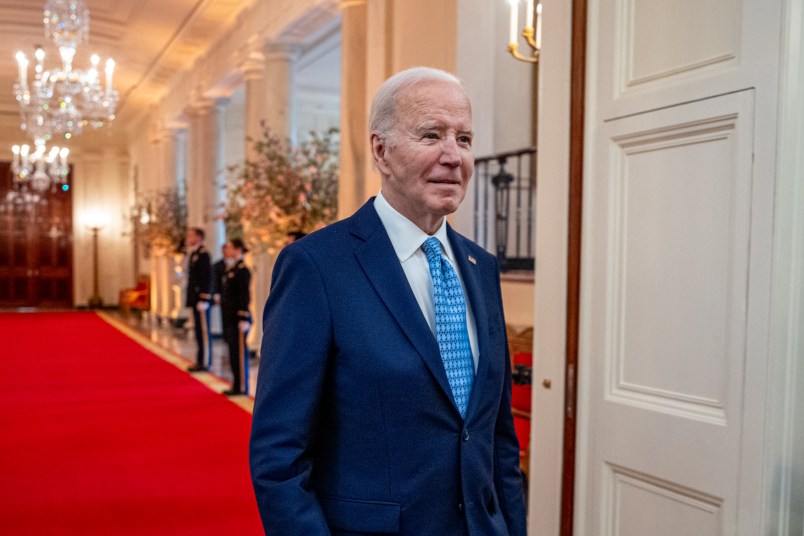TOM MCGEVERAN| Capital New York
Steve Kornacki feels pretty lucky right now–lucky to have his own weekend show on MSNBC, though in fact he’s worked hard to get to this point in his career–but especially lucky to be inheriting a show from Chris Hayes.
Earlier this week it was announced that Kornacki would replace Hayes as the moderator of “Up,” MSNBC’s Saturday and Sunday morning show airing from 8 to 10 a.m., in a shuffle that moved Hayes to prime-time weeknights.
And though Kornacki, less than one year Hayes’ junior, says he doesn’t just want to imitate the guy who came before him, there’s lots about what Hayes has built into the show that he wants to preserve.
“It’s a unique audience,” Kornacki told me when I got him on the phone earlier this week. “It trends every weekend on Twitter, and that’s organic. They are not beating viewers over the head with that. It’s just something that this audience sort of developed itself, and so the audience is really a part of the show that way.”
Kornacki knows this first-hand.
“I guest-hosted a few times and following along on Twitter during the show, more than other shows I’d been a part of as a guest, they are really plugged into the conversation, putting up links quickly, ‘look at this graph, look at this chart,’ and there’s only so much you can obviously do while you’re on the air.”
For Hayes, as well as for Kornacki, that’s something that works particularly well, because beneath the televisual veneer, they’re both deep analysts. That’s one reason his place in the late-afternoon gang on “The Cycle,” which threw him in a mix of anchors like strategist Krystal Ball, young pop-culture sage Touré and conservative columnist S.E. Cupp, seemed a funny kind of fit at the beginning.
I should say that I know Kornacki well: He was someone who my Capital and former New York Observer colleague Josh Benson had worked with when they both covered politics in New Jersey, and who Benson talked about and lobbied for incessantly until, finally, then-Observer editor Peter Kaplan hired him. Kornacki left the Observer around the same time the two of us did, and is currently, in addition to his MSNBC gig, a political writer at Salon.
I should also say, if it isn’t already clear, that I’m a Kornacki fan, and have been since long before he started doing Big TV. As a columnist he was ruthlessly rational and resistant to dogma, but he made his opinions clear, too, without muddying the whole thing. He was also immensely knowledgeable about politics, to the extent that readers who had never met or seen him assumed he was in his 50s or 60s rather than his late 20s. (Ask him about how Bill Clinton beat Paul Tsongas in 1992, if you ever have the chance. He will not answer like someone who was 11 at the time.) He was the best part of what the next generation was bringing to political commentary.
Kornacki’s showing that on MSNBC, where he also seems to be proving another concept, one that’s specific to TV.
In general, I think the premise of a television host who knows a little bit about a lot, who relies on researchers and producers but is slick enough to keep all the balls in the air, but whose only real contribution is likability and decent looks, has gotten too thin for serious viewers. Our hottest analysts, nowadays, bring something of their own, intellectually, to the table.
Nate Silver, the Big Thing in the last presidential election, brought a nuanced and carefully calculated statistical model into the conversation. Kornacki brings an encyclopedic knowledge of political history to the conversation, giving the stories of the moment both a specificity and a big-picture context that’s largely free of the booby-traps of “Jane, you ignorant slut” point-counterpoint culture of television news commentary that has needed to die for a long time.
And that, it seems, is an explicit part of the Kornacki proposition for MSNBC.
“What we are trying to do is dispute the intuition some people have that some topics are not TV-able, that are too complex or too difficult to address,” the show’s executive producer Jonathan Larsen told David Freedlander of The Daily Beast in an article appearing today. “Because that is what journalism should be about, pushing against that intuition.”
Freedlander’s piece seems to hint that Hayes’ show found success with a devotion to analytics and maps and graphs, but that the historical analysis Kornacki specializes in is a new proposition.
(Washington Post wunderkind Ezra Klein also frequently guest-hosted the show, and speculation favoring him for the job was hot enough to prompt an early, and it turned out mistaken, update on his Wikipedia page earlier this week that he’d gotten the job.)
But in lots of ways, moving from “The Cycle” to “Up” is a sort of transition Kornacki has made before: running an up-to-the-minute political blog while simultaneously writing columns for a weekly newspaper.
“To me [moving to “Up”] is sort of like the old daily newspaper versus weekly news magazine thing,” he said. “There’s an opportunity on the weekend, especially with us, to go at it from an angle that wasn’t explored, that’s just impossible to explore in the more fast-paced weekday environment.
“I think it’s sort of a prime example of the kinds of things that I’m interested in, the kind of areas where I have a solid background, I can see the themes of the kind of pieces I’ve written for [the Observer, Capital and Salon] being the kinds of things we get to do on a show like this.
“And I think what they have created, well, what Chris and everyone at ‘Up’ has created, is a brand-new, real smart model for weekend television.”
“When I sat in in December, we did one where the suspense at that point was about the Republican party and the fiscal cliff, and we were able to have a discussion that traced the development of anti-tax absolutism in the Republican party since Reagan … and put it into context, and it’s the kind of thing that I look back on it now, and in terms of where I would take it the word that comes to mind is continuity, they’ve created a basic format and why meddle with a good thing. And also, that piece I wrote for you guys on the 12-year story of Chris Christie’s rise in New Jersey and how Democrats enabled it, I just think there’s a real rich story there that people would like to get involved with and contribute to.”
Kornacki says he’s still working out what his continuing relationship will be with Salon, where he’s served as news editor and politics editor but now serves mostly as a writer, contributing stories every single day. (It seems like a lot, with two weekly two-hour weekend programs to prepare for, but another thing I happen to know about Kornacki is that he’s kind of a mutant, in productivity terms.)
I asked about his interest in TV, a medium he has never viewed as an add-on to his writing career.
“What it really was, was my first job was in New Jersey, with the then-novel concept of a state-specific website for New Jersey,” he said. “It paid the bills, or it paid some of the bills, and I met the guy who hosted the NJ-12 politics program and he wanted a sidekick, and he brought me on and that became my regular weekly gig.”
Steve Kornacki on TV, circa 2004.
“I enjoyed doing it, I enjoyed talking about what I’d been thinking through over the last week every week. And it helped me a lot in my writing in New Jersey, being a 21-, 22-year-old kid from Massachusetts. It helped for me to be taken seriously there. And I felt really really comfortable with it.”
That host was David Rebovich, a popular, likable and deeply knowledgable New Jersey-politics pundit who became Kornacki’s great influence.
“He pushed me a lot, told me my future is TV, the future is TV,” Kornacki said. So I wasn’t really sure from there, how to make a career in TV. But that encouragement was a lot of it.”
Rebovich died suddenly of a heart attack in 2007, at the age of 58. Kornacki, who by then was writing extensively for newspapers, continued to work his way into television, with guest appearances on Chris Matthews and ultimately a frequently repeated guest on Rachel Maddow’s show, before he was pulled into “The Cycle” and officially became MSNBC on-air talent.
“It’s different and for me it’s sort of a work in progress,” Kornacki said. “With writing, obviously you can really take the time to crack what you’re going to say and build to a big point. And in television there’s a lot more pressure and a level of urgency to get to the point right away, and I’ve found many times whether I was sitting in for Chris Hayes or other stuff I’ve done, I hear myself going on too long and going into too much detail–it’s all important to me because I’ve thought a lot about it, but I’ll catch myself and feel like, ‘stop!'”
I asked who his regulars were going to be, now that he gets to pick them.
“It’s happened real fast, I think in the last week, it was maybe last Tuesday or something like that that I knew I had the job,” he said. “I’ve actually spent more time in the last two days dealing with the logistics of all this than I expected to, so it’s something I’m starting to think about and starting to have conversations about.
“There was a study that looked at the diversity of all the weekend shows, and the ‘Up’ panel was by far the most diverse. So I think it’s great and I want to keep it up, and keep bringing in voices and perspectives that aren’t getting an airing and that deserve it. So, obviously there are some names I’ve thought of, and I probably shouldn’t mention them yet.”
Kornacki’s still working out when he’ll hosts his first show, but it will be a Saturday, soon, at 8 a.m on MSNBC.
Capital New York is a website about how New York City works, featuring news, analysis and investigations on politics, media, culture and sports. For more, visit http://www.capitalnewyork.com/. (c) 2012 Capital New York.





